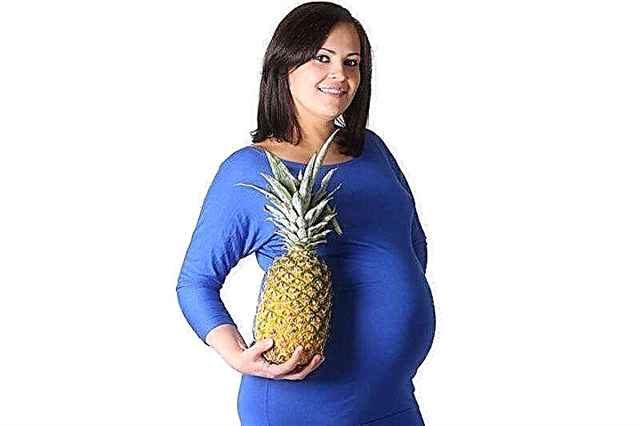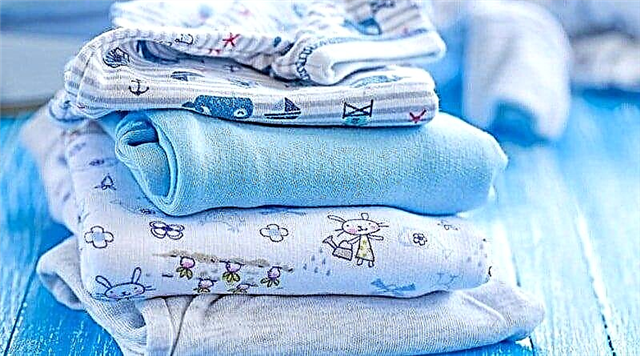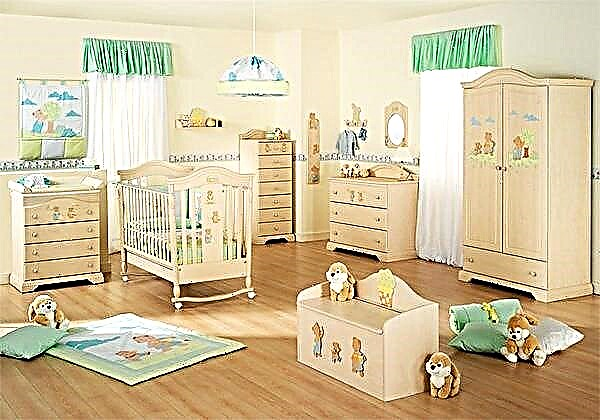Hiccups are a natural physiological process that occurs in many newborns after breastfeeding or formula feeding. All parents are obliged to know why hiccups occur, how to stop it and help the child. It is also important to understand how you can prevent this condition from occurring after feeding.

Baby lies
Why does a baby hiccup after feeding
After feeding, the tiny ventricle of the newborn, stretching, increases in size, begins to press on the diaphragm, this provokes hiccups. With the immaturity of the digestive tract or air entering the stomach, the child's hiccups appear immediately after eating. Sometimes it happens that the reason lies in any deviation, then the newborn hiccups after feeding for a very long time, and this happens regularly. If the situation is serious, then hiccups may be accompanied by regurgitation, which is not easy to get rid of. In this case, you should consult a doctor.
How hiccuping occurs
In the human body, there is a separating muscle called the diaphragm between the sternum and the abdomen. In newborn babies, it is very mobile and sensitive. When any stimulus is applied to the diaphragm, its convulsive contraction occurs, the vocal muscles begin to involuntarily close and you can hear the sounds characteristic of hiccups.

Baby hiccups and cries
Possible causes of hiccups
There are reasons why newborns have hiccups after feeding:
- When the baby sucks milk or mixture very quickly, a large amount of air can be swallowed with food. As a result, it enters the baby's ventricle, stretches it and presses heavily on the diaphragm. Because of this, breathing is disturbed, since the diaphragm begins to reflexively contract.
- In babies of the first months of life, due to an underdeveloped digestive system, bloating, intestinal colic and hiccups may occur after feeding.
- Due to fear, a sudden change of scenery or a suddenly heard loud sound, the diaphragm spasm, then it begins to convulsively contract, and you can hear the sound of hiccups.
- Newborn babies have a very underdeveloped system of thermoregulation of the body. They still cannot maintain their body temperature on their own, which is why they are freezing all the time and it is very easy to overcool them.
- An infant may often hiccup at a time when its not fully developed diaphragm contracts unexpectedly and irregularly.
- Excess food. When overeating, the ventricle is strongly stretched, which provokes convulsions of the diaphragm muscle and hiccups.
- Nutrition of a nursing woman. Babies often hiccup due to the fact that the wrong food is present in the mother's diet. Everything that the mother eats is passed on to the baby through lactation.
- Acid reflux. If your baby hiccups regularly, even when not overfed or swallowed too much air, this may be a symptom of gastroesophageal reflux disease (GERD). This is a condition in which a certain amount of stomach contents are returned back to the esophagus. All this causes both pain and hiccups at the same time.
- Newborn babies sometimes have an allergic reaction to some proteins in the formula or breast milk. It manifests itself in the form of inflammation of the esophagus, which is called eosinophilic esophagitis. The result is a spasm of the diaphragm and a hiccup sound.
- Irritants in the air. Infants have a very sensitive respiratory system and irritants in the air such as steam, dust or strong odors can cause frequent coughing. A persistent cough puts pressure on the diaphragm and makes it vibrate. For this reason, the baby has hiccups.
- The baby is thirsty and has a very dry mouth;
- The diaphragm can become irritated due to acute respiratory problems, when the throat is sore, or there is a severe cough.

Baby in mom's arms
Improper infant sucking on the mother's breast
It happens that hiccups occur due to improper suckling of the mother's breast. Often, the baby only captures the nipple with his mouth, due to such improper application, excess air penetrates into the stomach, and the crumbs begin to hiccup.
It is not necessary to eliminate hiccups if the mother adheres to simple rules:
- Lay the baby's head so that it is slightly raised. You can lay the baby on a pillow or mom's hand.
- The child should sit freely near the chest, nothing should squeeze his stomach, chest or legs. Let the baby lie down as it will be convenient and comfortable for him.
- The infant should completely grip the nipple. So he swallows less excess air.
- If the mother has a lot of milk in her breast, the newborn may not be able to cope with its flow, next time it is worth expressing a little.
- Do not forcefully remove the nipple from the baby's mouth. He must drop the breast himself when he is full.

Baby sucking breast
How to prevent baby hiccups
It is not difficult to prevent hiccups in a baby after feeding if you know the reason for its occurrence:
- It is possible to eliminate overeating, as the main cause of the reflex, by reducing the portion of the mixture or by shortening the latch on to the baby's breast in time. If the mother has a lot of front milk, it needs to be expressed a little so that the baby gets the rear more fatty milk in the right volume. It is preferable to feed the baby on demand, but significantly reduce the portion. You need to feed your baby in small portions for a longer time, and not "stuff" his tiny ventricle at a time. This will help avoid overeating, which often provokes hiccups in newborn babies.
- Positioning the baby upright at a 35-45 degree angle during feeds will help ensure that breast milk flows slowly through the esophagus.
- You need to listen to hear the sound that the baby makes while feeding. If it is too loud, then most likely the baby is swallowing too much excess air. It is worth adjusting the nipple in your mouth so that there is a very small air gap in it. When breastfeeding, you need to make sure that your baby's mouth covers the entire nipple.
- You need to clean and wash the formula bottles in a timely manner to prevent clogging of liquid around the hole in the nipple. An obstruction during feeding can cause the infant to swallow more air than formula, causing hiccups.
- Don't let your baby sleep with a full bottle. Unlike the breast, where milk will only flow through the sucking movements, the bottle will provide a constant flow of formula. This can cause overfeeding and hiccups.
- 10 minutes before feeding, lay the baby on the tummy so that excess air comes out of the stomach.
- During feedings, it is very important to maintain silence so that the baby is not distracted. Bright lights and sudden noise can scare your baby, distract him from eating, and cause him to swallow air.

Keeping a post against hiccups
How to eliminate hiccups
If hiccups in newborns after feeding, what to do in this situation? If the baby starts to hiccup immediately after feeding, you need to pick him up and hold him in the "column" position. This will help the baby to burp faster and free the ventricle from excess air and food if he ate too much. In addition, in the arms of the mother, the baby will calm down and warm faster, which will also help to quickly eliminate hiccups after eating.
If the child is on IV and often hiccups, you need to make sure that the mixture is suitable for him and does not provoke intestinal colic. In the case when hiccupping is associated with excessive gas formation in the intestines, it is worth giving the baby anti-colic drugs that will reduce the formation of gas.
Council. Colic that occurs after feeding will be relieved by an anti-colic tummy massage.
Also, the mother can take the baby in her arms, press her tummy to her. In an upright position, all the air that has entered the stomach while eating will be released. If the hiccuping is associated with overexcitation or fear, you need to calm the baby down.
Important! If hiccups appear very often, then you need to seek advice from a pediatrician, since such anxiety can be a signal of a small organism about developing diseases.

Upright position improves air discharge
If a newborn hiccups after feeding what to do, you can decide only by analyzing when the spasms are stronger, and where they start:
- While sucking on the breast or bottle of formula. If the mother has a large nipple, then the baby cannot fully capture it. In this case, during feedings, you need to keep the baby at an angle of 45 degrees. So the air that the baby will take along with the milk cannot enter the ventricle. When the newborn releases the nipple or nipple, the mother should stroke the back to relax the diaphragm muscles.
- If the child takes in too much excess air during the meal, then after he eats, the mother should hold him with a "column", pressing it to her body, but in no case put pressure on the tummy. Such actions will help the baby to burp up all the air that he swallowed with food.
- When a newborn baby, after each feeding, begins to press his legs to his tummy, this means that he is very worried about gas accumulated in the intestines. In this situation, it is better to give him some dill water or give him drops of flatulence.
- If hiccupping is associated with hypothermia or overheating while eating, you need to undress a little and cover the baby with a diaper. When a newborn sucks, he begins to sweat a lot, when he is already saturated and releases the breast, he begins to freeze.
- If the child overeats, you need to limit the amount of food. To do this, you can use the weighing technique before and after meals.
- If hiccups occur after spitting up, the baby should be given a spoonful of water to drink.
- Mom needs to adjust her diet, remove foods from the menu that can cause excessive gas formation. Do not eat fried foods, legumes, vegetables and fruits raw.
- In bottle-fed babies, the cause of hiccups may be in the nipple. In this case, it is worth purchasing an anti-colic bottle and a nipple with a valve that prevents the baby from trapping air and restricts the flow of the mixture.
Note! Do not put your baby in the crib immediately after feeding. You need to hold the crumb in your hands in an upright position for 10-15 minutes and wait until it belches up excess air.
What is forbidden to do when a child hiccups
When hiccupping, you do not need to do the following:
- You can't scare a baby. Such actions will not only not help, but also cause an attack of fright.
- You should not throw or slap the child on the back, this can scare him greatly, and the hiccups will continue for a very long time.
- Do not wrap the baby too warmly, as overheating is much more dangerous than hypothermia. The temperature in the room where the child is located should be about 20-22 degrees. If the baby is very cold, you can cover it with a diaper or a light blanket.
- Do not shake the baby so that he stops hiccuping, as this will seriously damage the baby's health.
When to see a doctor
Typically, hiccups do no harm to the baby. If during the hiccups the baby does not experience visible discomfort, then he does not need medical help. But there are situations when such a contraction of the diaphragm manifests itself in the form of symptoms of a serious illness and does not depend on feedings.
If the hiccups continue for a long time, it can be a manifestation of diseases such as:
- CNS damage;
- Meningitis and encephalitis;
- Pneumonia;
- Infectious diseases of the liver and kidneys;
- Congenital pathology of the digestive system, diaphragm, lungs;
- Neoplasms;
- Parasites in the intestines.
If, after eating, the diaphragm constantly contracts, and this lasts about an hour, the child cries and looks very restless, the mother should immediately consult a doctor. Only a pediatrician can establish the true cause of such a reflex.
Additional Information. If a child hiccups many times throughout the day, he has difficulty sleeping, it is difficult for him to eat and breathe, you should definitely consult a doctor.
As a rule, hiccups after feeding appear in newborns only during the first 2-3 months of life. As the nervous, respiratory and digestive systems develop, this phenomenon will gradually disappear and will no longer bother the child.



